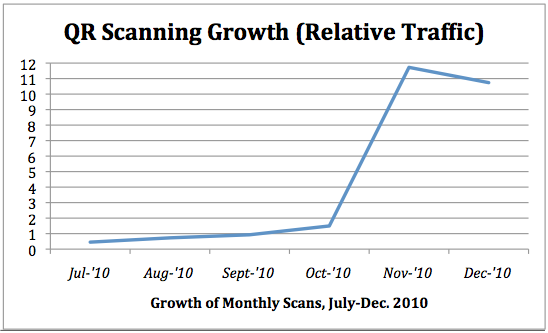In a surprising and silent move Google has stopped offering QR codes in the Google Places dashboard of businesses.
A QR code is a graphic which contains hidden data. Using an app on your smart phone, taking a photo of the QR code can send the browser on the smart phone to the website URL hidden in the QR code.
QR codes can be distributed anywhere you can display something.
QR codes meanwhile are still generated in Google's URL shortener.

WHY DOES GOOGLE REMOVE QR SUPPORT?
NFC stands for Near Field Communication. Small RFID-like passive transmitters can send out information to a smart phone if the device is within a 10 cm. range. The power of the receiver, the mobile phone, essentially feeds the RFID so that it, the transmitter, doesn't need to rely on a battery of its own.
A popular predicted application of NFC is to use your mobile phone as a wallet: you would pass it in front of a sensor instead of passing your bankcard through a slot.
Google works on a mobile payment system relying on NFC.
Google recently joined the NFC Forum.
Google says that they're "exploring new ways to enable customers to quickly and easily find information about local businesses from their mobile phones".
Besides QR codes and QR look-a-likes the only other technology available that would do that .. is NFC.
Perhaps this is Google's way of helping push businesses to use NFC?
THE FUTURE OF QR
22% of Fortune 50 companies already use QR codes.
Vancouver, Canada, based Mobio Identiy Systems Inc. reported that QR barcode scanning in North America saw a 1200% growth in the last months of 2010 (full report)
QR codes are easy to generate, simple to print, distribute and display. QR codes can appear anywhere print can.
QR codes can be processed by any smart phone with a camera and the right app.
For NFC to act as the carrier of information QR codes are commonly used for now by businesses an NFC-tag layer has to be added to the print medium.
To process NFC tags the smart phone has to support NFC.
The flexibility, ease, and low cost of QR code implementation seems to suggest prolonged life for QR.
WHAT THIS MEANS FOR YOU
If you're using QR codes, continue using them. If you're not yet using QR codes, consider using them but maybe you don't need to?
The signal Google is sending is interesting but not yet industry significant.

- QR codes are graphics that can take a mobile phone's browser to a page on the web
- Google used to automatically offer businesses that use Google Places a QR code for their web site
- Google has quietly stopped offering that code and has removed the code for those who already had it
- Google is likely trying to prep or nudge the market for NFC
- NFC = Near Field Communication; another way to get info from "something" into a mobile phone
- QR codes aren't going away yet as they're cheap & flexible

